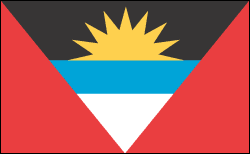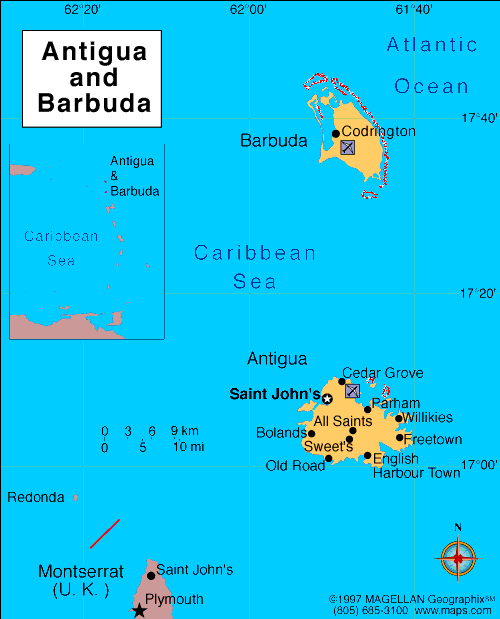ANTIGUA and BARBUDA

Geography: Antigua, the larger of the two main islands, is 108 sq mi (280 sq km). The island dependencies of Redonda (an uninhabited rocky islet) and Barbuda (a coral island formerly known as Dulcina) are 0.5 sq mi (1.30 sq km) and 62 sq mi (161 sq km), respectively.
Government: Constitutional monarchy.
History: The island of Antigua was explored by Christopher Columbus in 1493 and named for the Church of Santa Maria de la Antigua in Seville. Antigua was colonized by Britain in 1632; Barbuda was first colonized in 1678. Antigua and Barbuda joined the West Indies Federation in 1958. With the breakup of the federation, it became one of the West Indies Associated States in 1967, self-governing its internal affairs. Full independence was granted Nov. 1, 1981.
The Bird family has controlled the islands since Vere C. Bird founded the Antigua Labor Party in the mid-1940s. While tourism and financial services have turned the country into one of the more prosperous in the Caribbean, law enforcement officials have charged that Antigua and Barbuda is a major center of money laundering, drug trafficking, and arms smuggling. Several scandals tainted the Bird family, especially the 1995 conviction of Prime Minister Lester Bird's brother, Ivor, for cocaine smuggling. In 2000, Antigua and 35 other offshore banking centers agreed to reforms to prevent money laundering.
History: The island of Antigua was explored by Christopher Columbus in 1493 and named for the Church of Santa Maria de la Antigua in Seville. Antigua was colonized by Britain in 1632; Barbuda was first colonized in 1678. Antigua and Barbuda joined the West Indies Federation in 1958. With the breakup of the federation, it became one of the West Indies Associated States in 1967, self-governing its internal affairs. Full independence was granted Nov. 1, 1981.
The Bird family has controlled the islands since Vere C. Bird founded the Antigua Labor Party in the mid-1940s. While tourism and financial services have turned the country into one of the more prosperous in the Caribbean, law enforcement officials have charged that Antigua and Barbuda is a major center of money laundering, drug trafficking, and arms smuggling. Several scandals tainted the Bird family, especially the 1995 conviction of Prime Minister Lester Bird's brother, Ivor, for cocaine smuggling. In 2000, Antigua and 35 other offshore banking centers agreed to reforms to prevent money laundering.

Map of
Antigua and Barbuda
Sovereign: Queen Elizabeth II
(1952)
Governor-General: Rodney Williams
(2014)
Prime Minister: Gaston Browne
(2014)
Total area: 170 sq mi (440 sq km)
Population (2014 est.): 91,295 (growth
rate: 1.25%); birth rate: 15.94/1000; infant mortality rate:
13.29/1000; life expectancy: 76.12
Capital and largest city (2011 est.):
St. John's, 27,000
Other large cities: English
Harbour, 2,900; Codrington (capital of Barbuda), est. pop. 870
Monetary unit: East Caribbean
dollar
Languages:
English (official), local dialects
Ethnicity/race:
black 91%, mixed 4.4%, white 1.7%, other
2.9%
Religions: Protestant 76.4%
(Anglican 25.7%, Seventh-Day Adventist 12.3%, Pentecostal 10.6%,
Moravian 10.5%, Methodist 7.9%, Baptist 4.9%, Church of God 4.5%), Roman
Catholic 10.4%, other Christian 5.4%, other 2%, none or unspecified
5.8% (2001 census)
National Holiday:
Independence Day (National Day), November 1
Literacy rate: 99% (2011 est.)
Economic summary: GDP/PPP (2013
est.): $1.61 billion; per capita $18,400 (2013 est.). Real
growth rate: 1.7% (2012 est.). Inflation: 3% (2013
est.). Unemployment: 11% (2001 est.). Arable land:
9.09%. Agriculture: cotton, fruits, vegetables, bananas,
coconuts, cucumbers, mangoes, sugarcane; livestock. Labor
force: 30,000 (1991); agriculture: 3.8%, industry: 22%,
services: 74.3% (2002 est.). Industries: tourism,
construction, light manufacturing (clothing, alcohol, household
appliances). Natural resources: negl.; pleasant climate
fosters tourism. Exports: $55 million (2013 est.):
petroleum products 48%, manufactures 23%, machinery and transport
equipment 17%, food and live animals 4%, other 8%. Imports:
$340.8 million (2013 est.): food and live animals, machinery and
transport equipment, manufactures, chemicals, oil. Major trading
partners: Poland, UK, Germany, Italy, China, U.S., Singapore,
Spain, Trinidad and Tobago (2006).
Member of Commonwealth of Nations
Communications: Telephones: main lines
in use: 35,000 (2012); mobile cellular: 179,800 (2012). Radio
broadcast stations: state-controlled Antigua and Barbuda
Broadcasting Service (ABS) operates 1 TV station; multi-channel cable TV
subscription services are available; ABS operates 1 radio station;
roughly 15 radio stations, some broadcasting on multiple frequencies
(2007).
Television broadcast stations: 2 (1997). Internet
hosts: 11,532 (2012). Internet users: 65,000 (2009).
Transportation: Highways: total:
1,170 km, paved: 386 km, unpaved: 784 km (2011). Ports and
harbors: Saint John's. Airports: 3 (2013).
International disputes: none.
-------------------- o --------------------
No comments:
Post a Comment